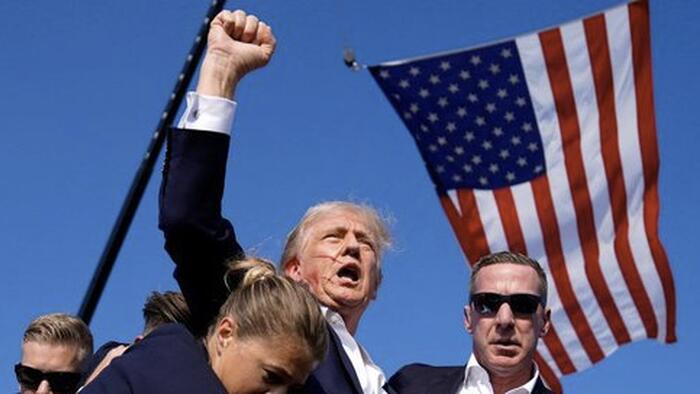In the interpretation of the recent U.S. election, Nic Carter presents a view that positions Donald Trump and Kamala Harris in a profound spiritual conflict, suggesting that this dynamic extends beyond mere politics into the realm of religious ideology. He argues that Trump’s survival of an assassination attempt, which left him with only a grazed ear, signifies divine intervention and supports the belief among his Christian followers that he has been chosen by God for a greater purpose. Carter likens Trump’s experiences to that of Job from the Bible, asserting that despite numerous challenges, including impeachment and lawsuits, Trump has demonstrated remarkable resilience, leading to what many consider one of the greatest political comebacks in American history. This perspective portrays Trump as a messianic figure who has endured trials meant to strengthen his resolve.
Conversely, Carter contends that Harris and her supporters embody a different spiritual framework, rooted in what he describes as modern secular religions or “idolatrous” beliefs. Under his critique, the contemporary left has replaced traditional religious structures with ideologies he deems as cult-like. He identifies three main secular religions subscribed to by Harris and her followers: climate doomerism, wokeism, and AI safety. These movements foster a narrative of impending apocalypse or punishment for humanity’s transgressions against nature, mirroring biblical prophecy. Carter asserts that these ideologies represent a spiritual void left by the decline of Christianity and that adherence to them is marked by an addiction to fear and guilt rather than genuine faith or solutions.
Carter then elaborates on the particulars of these ideologies, particularly in the context of climate and AI. He criticizes the left’s approach to environmental issues as misguided and ineffective, framing their “green transition” initiatives as a form of superstition rather than sound policy. In contrast, he believes Trump advocates for a practical re-energization of the U.S. economy through the harnessing of abundant energy resources and technological advances without the constraints of environmental guilt. Similarly, Carter argues that Trump views AI as a valuable asset for economic growth rather than a potential threat, a perspective he believes reflects a far more constructive approach to modern challenges.
Delving deeper into the concept of “wokeism,” Carter compares it to older religious doctrines while highlighting its unique shortcomings. He notes that wokeism lacks a framework for redemption similar to that in Christian belief, making it inherently unsustainable. This lack of absolution generates a systemic friction within the ideology itself, as it relies on a hierarchy of privilege and oppression without offering any real path for those at the top to redeem themselves. This, according to Carter, erodes the foundational appeal that traditional religions possess, ultimately leading to disillusionment among its adherents, who may struggle with their status within a system that offers no true relief from guilt.
Framing the election in these spiritual terms, Carter emphasizes the deep-seated ideological divide between Trump and Harris, which encapsulates broader worldviews surrounding meritocracy, structuralism, and the role of government. He describes Trump as an unintentional messiah thrust into a role of salvation, despite any personal faith he may express being more performative than genuine. In contrast, Harris is portrayed as a vessel for progressive ideals, primarily elected to represent a coalition stitched together by identity politics rather than substantive policy. Her campaign, in Carter’s view, relied on superficial appeals to targeted voter demographics without addressing the underlying issues that might sway undecided constituents.
Post-election, Carter expresses optimism from a conservative and Christian standpoint, celebrating what he views as a rejection of woke ideologies and the advances of the Democrat party. He cites demographic shifts that reveal a noteworthy transition, particularly among Hispanic voters and religious demographics, towards Trump and the right. This outcome is framed not as a fluke but as a significant realignment reminiscent of Reagan’s era. The reluctance of moderate and suburban voters to engage with Harris’s platform, perceived as veering too far into culture wars without addressing pressing economic concerns, reflects a broader electoral fatigue with the left’s approach. According to Carter, this underscores the precarious state of the Democrat coalition, which he believes must reconsider its strategies if it hopes to regain political ground.
Finally, Carter argues that the outcome of the election signifies a shift in the spiritual and political mantle in American society. He posits that the left has forfeited what he calls the “Mandate of Heaven,” a concept denoting divine favor for their cause, which he believes now rests with Trump. As America’s political landscape continues to evolve, Carter suggests that the role of genuine religion and spiritual conviction will remain pivotal, framing it as a battleground in the ongoing conflict for America’s soul in which the stakes are existential. In essence, he’s asserting that the recent election results manifest a broader cultural and spiritual awakening that challenges the existing paradigms established by progressive ideologies, reaffirming a faith-based narrative centered around restoration and divine purpose.

